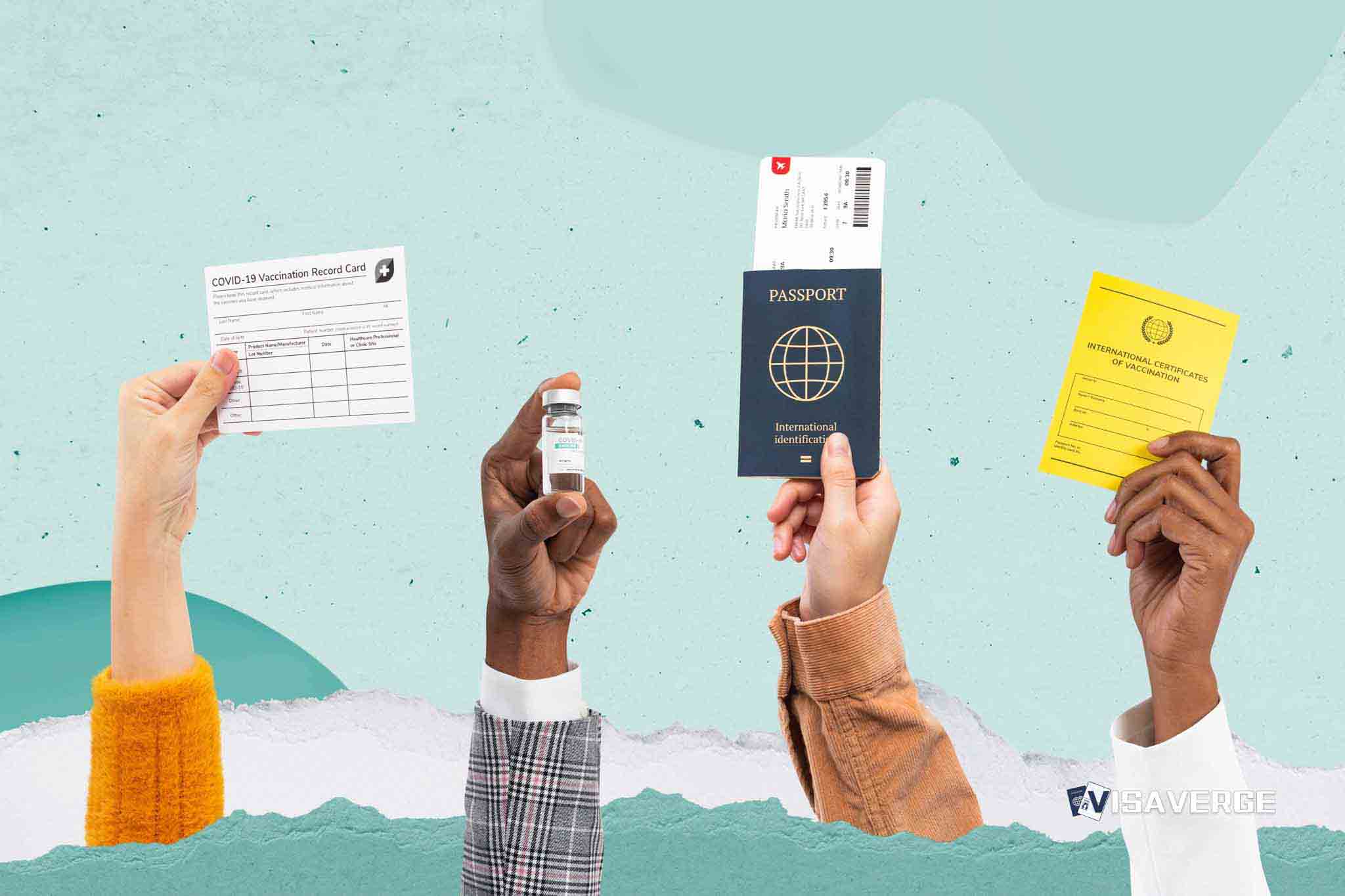Key Takeaways
• Estonia introduces Startup, Digital Nomad, and eased skilled worker visas in 2025 to address labor shortages.
• Digital Nomad Visa requires €3,504 monthly income; Startup Visa supports founders and employees with family relocation.
• Visa applicants must show clean records, qualifications, and submit detailed documents; processing time varies by visa.
Estonia has introduced new visa programs for 2025, creating a set of structured pathways designed for foreign experts and skilled workers. These changes are a direct answer to Estonia’s growing need for highly qualified workers across multiple important sectors. This move is also part of a larger goal: to make the country’s economy stronger, ready for challenges, and more competitive in a fast-changing world. Here is a detailed explanation of these visa programs, what they mean for different groups, and why they matter so much for Estonia today.
Definition of Estonia’s Dynamic Visa Programs

The new visa programs launched by Estonia in 2025 are special visas and permits designed to bring in foreign experts, skilled workers, and business starters. They include changes to the existing system and new ways to help specific sectors that face worker shortages. The most important new visas are the Startup Visa and the Digital Nomad Visa, along with improved rules for skilled worker permits. Each visa type is built to meet the needs of both foreign experts and Estonia’s economy.
Eligibility Requirements
Estonia’s updated visa programs set clear standards for who can apply:
- Startup Visa: Open to founders of innovative startups and skilled employees joining approved Estonian startups. The startup must be reviewed and accepted by Estonia’s Startup Committee.
– Digital Nomad Visa: For people who work remotely for a foreign company or run their own business from outside Estonia. You need to show you have a remote work arrangement and a gross monthly income of at least €3,504. - Eased Work Permit Options: Skilled workers in sectors like engineering, IT, health, industrial manufacturing, construction, and logistics. All applicants must go through background and qualifications checks.
The focus is on high-demand fields suffering from talent shortages, so applications from those with skills in these areas have much better chances.
Purpose and Benefits of the Visa Programs
The main purposes of these new visa paths include:
- Addressing Labor Shortages: Estonia faces yearly gaps of about 1,400 top-level experts and another 700 skilled workers in key sectors. These programs are meant to close these gaps and keep the country’s economy running strong.
- Encouraging Innovation: By inviting startup founders and supporting digital businesses, Estonia intends to remain a hotspot for new ideas and technology.
- Attracting Investment: Skilled foreign experts and entrepreneurs often bring investment, which helps local businesses grow.
– Family Support: The Startup Visa, in particular, makes it easier for families to move together, making life more stable for foreign talent.
Benefits for applicants include simple processes, access to Estonia’s digital tools (like e-residency), a safe environment, and entry into the larger European Union market.
Step-by-Step Application Process
The process can differ by visa type but usually involves these main steps:
Startup Visa
- Idea Submission: The applicant proposes their startup to the Estonian Startup Committee.
- Review: The Committee checks if the business is truly “innovative.”
- Residence Permit Application: Once approved, the founder or employee applies for a visa or a residence permit.
- Supporting Evidence: Submit proof of startup approval, a business plan, and other documents.
- Family Relocation: Applicants can include family members in their application.
Digital Nomad Visa
- Gather Proof: Show you work remotely, have steady income, and meet the €3,504 monthly threshold.
- Complete Application: Fill out the official Estonian Digital Nomad Visa application.
- Submit Documents: Include a work contract, income statements, and proof of remote work.
- Await Decision: Estonian authorities check your background before granting the visa.
Eased Work Permit Rules
- Find a Job: Secure employment in one of Estonia’s priority sectors.
- Employer Registration: Your employer registers your details for a short-term or long-term permit.
- Background and Skills Check: Submit proof of qualifications and a clean background.
- Receive Work Permit: Once approved, commence work legally in Estonia.
Required Documents and Evidence
Each pathway asks for different paperwork, but most require:
- Valid passport
- Proof of job offer or startup approval (for Startup and skilled work permits)
- Proof of remote employment and monthly income (for Digital Nomad Visa)
- Curriculum vitae (CV) with detailed work history
- Evidence of education or professional credentials
- Police clearance or criminal background check
- Health insurance proof
- Accommodation details in Estonia
Applicants must keep all information up-to-date and accurate, as strict checks are a core part of the process.
Processing Times and Fees
- Startup Visa: Review for startup approval usually takes 10–30 days. The residence permit process may take 1–2 months. Fees differ but generally start from €100–€200 for application.
- Digital Nomad Visa: Processing takes about 30 days. The state fee is €80 for a short-term and €100 for a long-term stay.
- Eased Skilled Worker Permits: Short-term registration can be done quickly—sometimes within 15 days. Long-term residency can take up to 2 months.
Processing times can be affected by the accuracy of information and the volume of applications. It’s recommended to apply as early as possible, as delays may occur during busy periods.
Validity Period and Renewal Options
- Startup Visa: Usually linked to the duration of the business’s activities and specific employment terms, ranging from one to five years. Extensions may be possible if the company remains active and meets required conditions.
- Digital Nomad Visa: Issued for up to 12 months, with the chance to apply for another 12-month extension.
- Eased Skilled Worker Permits: Short-term permits valid for up to 12 months; long-term options allow for multi-year residence, renewable if job conditions persist.
It’s important to apply for renewal well before your visa or permit expires to avoid any gaps in your legal status.
Rights and Restrictions
Visa holders under Estonia’s new programs benefit from:
- The right to live and work in Estonia, sometimes with family.
- Access to Estonia’s digital tools and services, such as the e-residency platform.
- Free movement within the Schengen Area for short trips.
However, there are important restrictions:
- Digital Nomad Visa holders cannot work for Estonian companies.
- Permit holders must maintain employment or business activity to keep their status.
- Applicants must show clean criminal records and remain in good standing.
- Local labor market rules are protected, so jobs for foreign workers must not unfairly displace Estonian citizens.
Pathways to Permanent Residency
For many foreign experts, Estonia’s visa programs are a stepping stone to long-term residence or citizenship.
- Time spent on residence permits may count toward the legal residency period needed for permanent residence.
- After five years of legal residence, most workers can apply for long-term residency if they meet other requirements (like language knowledge and integration test).
- Startup founders and highly skilled workers may benefit from fast-tracked options based on established economic contribution.
All applicants must follow local rules, pay taxes, and remain in good standing with the authorities during their stay.
Comparison with Similar Visa Types
Estonia’s approach stands out among European countries:
- The Startup Visa is more flexible than some EU schemes, giving easy access to the e-residency program and making family relocation simpler.
- The Digital Nomad Visa features a clear income requirement and targets people already working for non-Estonian companies. This is similar to digital nomad visas in other EU countries but has lower bureaucracy thanks to Estonia’s digital systems.
- The Eased Skilled Worker Permit options are tailored for sectors with labor shortages, making the path to work permits quicker and more predictable.
Unlike programs in some other countries, Estonia’s schemes are deeply linked to its strong digital infrastructure, which makes applying, living, and doing business in Estonia much easier for foreign experts.
Common Misconceptions and FAQs
Q: Does the Digital Nomad Visa let me work for Estonian employers?
A: No. You must work for a foreign company or have your own business outside Estonia. Estonian employment is a separate track.
Q: Is family relocation available on all visas?
A: It is generally available for Startup Visa holders, but not always for the Digital Nomad Visa. Check individual program rules before applying.
Q: Do these visas guarantee a path to permanent residence or citizenship?
A: Not automatically; you must meet all residency rules and stay in good standing.
Real-World Examples
- Startup Founder: A tech entrepreneur from India 🇮🇳 gets the Startup Visa, moves to Estonia, launches a software company, and hires local workers. The founder brings family members, enjoys simplified tax paperwork, and grows the business with access to EU markets.
- Digital Nomad: A Canadian 🇨🇦 web designer working for US 🇺🇸 clients uses the Digital Nomad Visa to live in Tallinn for a year. She meets friends, explores Europe, and enjoys Estonia’s digital services while paying taxes in her home country.
- Skilled Worker: A German 🇩🇪 engineer accepts a job in Estonia’s construction sector. Because his field is on the priority list, his work permit is approved quickly, and after several years he applies for long-term residency.
Recent Changes and Updates
The 2025 reforms go beyond just simplifying paperwork—they mark Estonia’s most ambitious immigration changes in years. The government is:
- Expanding the Startup Visa’s scope to allow a wider group of foreign experts access.
- Introducing clear income rules for digital nomads.
- Adding more priority sectors to ease skilled worker entry.
- Keeping strong background checks despite relaxed procedures.
Pros and Cons
Pros:
– Quick, digital-first application systems.
– Focused on real economic needs.
– Open to innovators, investors, remote workers, and skilled professionals.
– Makes family relocation easier for some programs.
Cons:
– Not all sectors are eligible.
– Non-negotiable security checks can delay approval.
– Some confusion about which visa fits each applicant.
– Digital nomad pathway doesn’t allow work for Estonian firms.
Additional Resources
For full details, official forms, and real-time updates, visit the Estonian Police and Border Guard Board website. You can also check sector priority and special program rules there.
As reported by VisaVerge.com, Estonia’s new visa programs show a strong commitment to building a talent-friendly, robust economy ready for the future. For foreign experts and skilled newcomers, these programs offer a clear way to bring new skills to Estonia, enjoy a high quality of life, and play a direct part in the country’s continued growth.
In summary, Estonia’s 2025 visa changes make it easier for foreign experts—like startup founders, digital nomads, and skilled workers—to live and work in the country. The focus on key sectors, modern digital systems, and clear rules makes these programs attractive for anyone looking to join one of Europe’s most forward-looking nations. For those interested, starting with official resources and checking program fit is the safest way to begin the process.
Learn Today
Startup Visa → A visa allowing founders and employees of approved innovative startups to live and work in Estonia.
Digital Nomad Visa → A permit for remote workers earning at least €3,504 monthly to reside in Estonia without local employment.
Skilled Worker Permit → Visa enabling qualified professionals in priority sectors to legally work and reside in Estonia.
E-residency → Estonian digital identity allowing non-residents to establish and manage businesses remotely online.
Residence Permit → Official authorization to live in Estonia for a specified period under visa programs.
This Article in a Nutshell
Estonia’s 2025 visa programs target skilled foreign experts and innovators, offering simpler routes for startups, digital nomads, and priority workers with clear income rules and family support, advancing economic growth and digital integration across sectors facing talent shortages.
— By VisaVerge.com
Read more:
• California Colleges See Immigrants Flee ESL Programs
• Business Class Flights for Fewer Miles: Tips from Airline Loyalty Programs
• U.S. Embassy Demands Stockholm Kill DEI Programs
• Ski industry warns of staff shortages if visa work programs change
• Golden visa programs reshape global migration priorities













